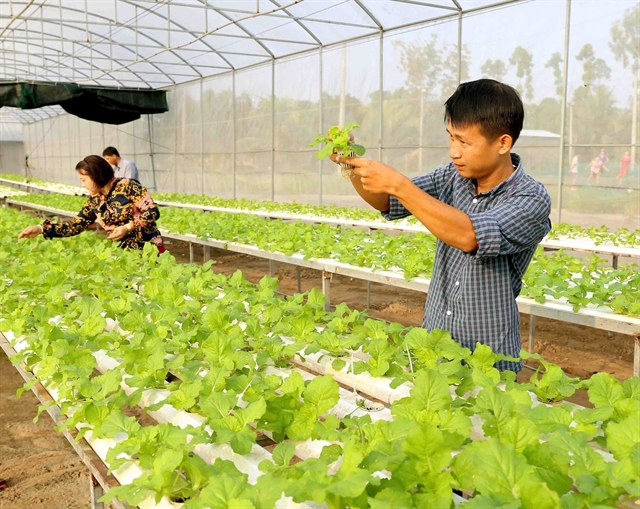
AN GIANG — The Cửu Long (Mekong) Delta province of An Giang plans to develop concentrated vegetable growing areas that use advanced techniques and production codes to facilitate exports.
An Giang, one of the delta’s largest vegetable growing provinces, plans to develop 6,000ha by 2025, focusing on leaf, root and fruit vegetables, corn, peanut, and taro.
It targets half the area getting production codes, 1,350ha getting Vietnamese good agricultural practices (VietGAP) certification and 350ha getting GlobalGAP certification by 2025.
It will promote farming by co-operatives and co-operative groups in these areas under value chains.
It targets increasing incomes from these areas by at least 40 per cent in 2025 compared to last year.
Trần Anh Thư, deputy chairman of the province People’s Committee, said the province would support co-operatives, co-operative groups and companies investing in processing and preserving vegetable products.
“The province … will renovate and develop agricultural production models based on market demand, value chain development, large production scale, and linkages between companies, co-operatives, co-operative groups, and farmers.”
It also plans to improve forecasting of market demand, promote trade and shift exports of vegetable products to Cambodia and China from unofficial to official channels.
It will expand exports to promising markets like the EU, Japan, Australia, and South Korea.
It will help set up eight new co-operatives and co-operative groups that grow clean vegetables, process and distribute vegetables.
All co-operatives will be granted the right to use the An Giang brand name for their vegetables.
Clean vegetables
An Giang has encouraged farmers in recent years to use advanced techniques to grow clean vegetables.
Nguyễn Văn Sách of Mỹ Thạnh Ward in Long Xuyên City has switched from growing vegetables using traditional farming methods to organic standards with encouragement from the city Agriculture Extension Centre.
For his first crop after the switch, he was taught farming techniques and provided cucumber seedlings and organic fertilisers by the centre, he said.
Now he also grows other vegetables like various gourds and winter melon, he said.
“The yield of organic vegetables is not high but their production costs are lower, and so the profit is still good.”
The province Farmers Association also supports its members.
Its Farmer Support Fund provided soft loans worth a total of VNĐ30.9 billion (US$1.35 million) to 1,084 farmers last year for growing vegetables, fruits and other produce, raising animals and doing business.
The province encourages farmers with unproductive rice fields to grow other, high-value crops instead, including vegetables, to improve their incomes, and more than 31,100ha have been converted since 2016 to grow vegetables and fruits.
According to Nguyễn Sĩ Lâm, director of the province Department of Agriculture and Rural Development, the income from vegetables is VNĐ120-150 million ($5,300 -6,600) a year per hectare.
In 2021-25 the province plans to convert another 34,100ha of unproductive rice fields to grow vegetables and fruits.
Thư, deputy chairman of the People’s Committee, said the province would help farmers acquire quality seeds and high technologies to reduce costs and increase yields.
It targets agricultural sector growth of 2.8 per cent a year in 2021-25, the same as in 2016-20. — VnExpress News
- Reduce Hair Loss with PURA D’OR Gold Label Shampoo
- Castor Oil Has Made a “Huge” Difference With Hair and Brow Growth
- Excessive hair loss in men: Signs of illness that cannot be subjective
- Dịch Vụ SEO Website ở Los Angeles, CA: đưa trang web doanh nghiệp bạn lên top Google
- Nails Salon Sierra Madre
 VnExpress News The News Gateway of Vietnam
VnExpress News The News Gateway of Vietnam





